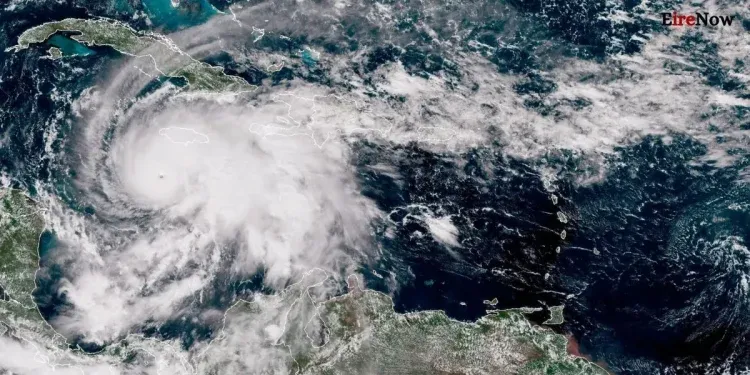CARIBBEAN & IRELAND – Hurricane Melissa, the most powerful storm seen globally this year, has rapidly intensified into a Category Five hurricane, threatening “catastrophic” damage as it bears down on Jamaica.1 Experts attribute the storm’s extraordinary strength primarily to a warming climate, with ocean waters providing record levels of energy.2
Strength and Climate Link
Melissa jumped from a tropical storm to a Category Four in just 24 hours and has since strengthened further to Category Five, the highest on the Saffir-Simpson scale, with sustained winds exceeding 3$225\text{ km/h}$.4
Professor Peter Thorne, Professor of Climate Science at Maynooth University, stated that the “heat of the Caribbean is the rocket fuel” for the storm. Analysis from Climate Central indicates that Melissa passed over waters 5$1.4^\circ\text{C}$ warmer than the seasonal average, conditions made at least 500 times more likely by human-caused global warming.6 Furthermore, the ocean warmth extended to deeper levels, preventing the slow-moving storm from undergoing its usual self-destructive weakening process.7
The storm is already responsible for fatalities in Haiti and the Dominican Republic and is poised to be the strongest storm to ever hit Jamaica since records began 174 years ago, with catastrophic wind, flooding, and storm surge expected.8
Impact on Ireland
The remnants of Hurricane Melissa are currently forecast to track northeast across the Atlantic. While the storm is expected to weaken significantly after interacting with colder waters and different weather systems before reaching the North Atlantic, its influence may still be felt in Ireland.9
A meteorologist from Met Éireann indicated that the remnants could bring “plenty of rain and unsettled weather” to Ireland late in the weekend or early next week.10 However, they stressed that it is “too soon to tell” the exact effects. By the time the system reaches Irish shores, the original hurricane structure will have likely transitioned into a different, less intense system—often referred to as an ex-hurricane—which is a common source of unsettled weather for the country.11 Further clarification on the exact impact is expected in the coming days.







